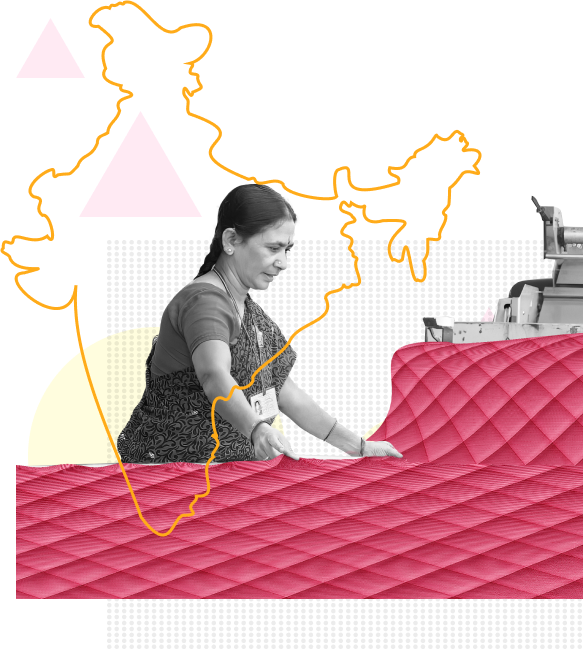
How Polyfill took
Karle from
Above 25°
to below 25°
The Era of Liberalisation
In the late 1980s, the Indian economy was lagging behind its East and South East Asian neighbours. The post-independence protectionist policies did not allow the economy to grow and compete globally.

The Era of Liberalisation
In the late 1980s, the Indian economy was lagging behind its East and South East Asian neighbours. The post-independence protectionist policies did not allow the economy to grow and compete globally.

The garment manufacturing industry was an important contributor to the Indian GDP. The government, in an attempt to promote liberalization and revive the economy, started to endorse powerloom mills, provide subsidies and allow the import of fabrics and accessories.
Post Madras Checks Boom
Karle International, the garment export vertical of Karle Group, saw a steady stream of business post the Madras Checks boom. With the change in government policies, the company took the opportunity to import fabric. This allowed the company to manufacture a variety of garments.

Post Madras Checks Boom
Karle International, the garment export vertical of Karle Group, saw a steady stream of business post the Madras Checks boom. With the change in government policies, the company took the opportunity to import fabric. This allowed the company to manufacture a variety of garments.

Rising Global Competition
Globally, nations had switched to assembly line production. Assembly line production breaks the manufacturing process into steps that are completed in a pre-defined sequence, reducing costs, time and increasing quality and efficiency. Output could be measured in minutes and a shirt could be made in just 40 minutes!
Karle International realised the need for significant change to stand out from the stiff global competition. Company ambassadors were sent to other countries to study assembly lines. With the learnings they brought back, Karle International was one of the first to invest in and set up a process led, automated assembly line in Bangalore.

Karle International realised the need for significant change to stand out from the stiff global competition. Company ambassadors were sent to other countries to study assembly lines. With the learnings they brought back, Karle International was one of the first to invest in and set up a process led, automated assembly line in Bangalore.

People Before Profit
While automation enabled efficiency, it was empathy that built the culture of Karle International. The company supported its workers through fair wages, healthcare benefits, education grants, child-support and woman empowerment policies, garnering global accolades from its customers and more importantly building trust with its employees.
The Magic of Poly Fibre
The synthetic, durable, lightweight fibre is the perfect insulation for garments in sub-zero temperatures and is used as a replacement for feather stuffing in jackets. These jackets are highly technical to produce and require stringent quality tests to check the sanctity of water-proof seams.

The Magic of Poly Fibre
The synthetic, durable, lightweight fibre is the perfect insulation for garments in sub-zero temperatures and is used as a replacement for feather stuffing in jackets. These jackets are highly technical to produce and require stringent quality tests to check the sanctity of water-proof seams.

Global Footprint
The process changes that Karle International had made, gave the company an opportunity to take up the specialised manufacturing of polyfilled jackets and the company became one of the few in the country tosuccessfully compete with other global manufacturers.
Polyfill x India x Karle
As the Indian garment manufacturing industry realigned to create more quality driven products, international brands started looking towards India again. For Karle, this translated to how effectively people, time and machines were managed to create a strong culture and ultimately strong processes that stood the test of time.

Polyfill x India x Karle
As the Indian garment manufacturing industry realigned to create more quality driven products, international brands started looking towards India again. For Karle, this translated to how effectively people, time and machines were managed to create a strong culture and ultimately strong processes that stood the test of time.
Celebrating Milestone
Products That Shaped 50 Years
of The Karle Group.



